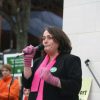KJIPUKTUK (Halifax) – When it comes to environmental justice, are environmental organizations listening? Are we willing to change in the ways that we are being asked?
Environmental justice movements define our environment more broadly than the mainstream environmental movement, recognizing the interconnectedness of the social and ecological crises we are facing. Centring the voices of Black, Indigenous and people of colour, environmental justice works to resist and reshape the ways that race, space and power intersect. These grassroots advocates have also repeatedly called on mainstream environmental organizations to addressenvironmental racism, elitism in the movement, and lack of diverse representation on our staffs and boards.

As questions around diversity, decolonization, and justice begin to gain more traction in mainstream social movements, environmental organizations are beginning to respond. But the path is messy and uncertain. As Ecology Action Centre‘s Joanna Bull describes: “We don’t actually even see what were being asked to do yet, I don’t think. We being the environmental movement. I don’t think we fully understand what is seen as problematic about the way we are now. And I think a lot of those things that are problematic are really deeply entrenched with the structure of how we exist.”
In this episode we’re going to explore some of the ways that the environmental movement has responded to the challenges presented by environmental justice, including some stories of Ecology Action Centre’s own journey here in unceded Mi’kmaq territory. We’ll be asking some uncomfortable questions as part of this work to explore our complicity with the oppressive systems we are fighting. We’ll be practicing listening to environmental perspectives from outside of our bubble. And we’ll be wondering about our own roles and responsibilities when it comes to a just future here in Mi’kma’ki and beyond.

We don’t have any answers, but we want to share the questions we have been asking so far, in the hopes that more of us can begin to share this messy work of shifting from good intentions to good practice. As Dr. Carolyn Finney suggests, these questions are just the beginning: “Maybe what we need to do is to be asking different questions. Maybe what we need to do is to restructure the way we’re in relationship to one another across difference. And that is a lot more work. It might change everything we’re doing.”
We hope you’ll tune into this Shades of Green podcast episode, “Listen Up: On Building Relationships Across Difference in the Environmental Movement.” Stay curious with us as we dig into some juicy questions that challenge us to step up to the work of building a just future together.
Featured Voices:
- Joanna Bull
- Eriel Deranger
- Barbara Low
- Randolph Haluza-Delay
- Lynn Jones
- Stephen Thomas
- Dr. Ingrid Waldron
Quotes have been condensed here for clarity and brevity. Huge thanks to every one of the ears and voices that made this episode possible. Further thanks to Joanna Brenchley, Erica Butler, Cintia Gillam, Jen Graham and Peter Lane.
Our theme was composed by the incredible Nick Durado. We are also grateful for permission from Ansley Simpson to excerpt from her lovely song A Mixture of Frailties.
This project has been supported by Ecology Action Centre and the Community Conservation Research Network
Subscribe on iTunes, SoundCloud, Stitcher, or Feedburner. And follow us on Twitter!
Further Reading:
Errol Schweiser: Environmental Justice- An Interview with Robert Bullard
Green 2.0: Formally the Green Diversity Initiative
Randolph Haluza-Delay and Heather Fernout: Sustainability and social inclusion?
Peggy McIntosh: White Privilege Unpacking the Invisible Knapsack
Robin DiAngelo: White Fragility and the Rules of Engagement
Principles of Environmental Justice
Dr. Tane Ward: Decolonizing Environmentalism
Universal Declaration of the Rights of Mother Earth
adrienne maree brown: Transforming Ruckus- Actions Speak Louder



